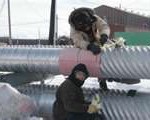Whether this is your first or tenth season of leaving the cold and snow of the North for the sun and warmth of the South you should be aware of some basic precautions to help reduce the risk of water damage to your home. Taking a few moments now to think about prevention can go a long way towards insuring that your (Springtime) return will be a pleasant one.

Snowbirds Beware!
Some useful tips:
- Get a House Sitter – The best way to insure that Winter damage can not get a foothold in your home is to have a friend or relative live in your home while you are away. If this is not possible then a house visitor would be the next choice, someone who can check up on your home regularly and make sure all is well.
- Install Heat and Water Sensors – There are devices available which will sound an alarm if the heat in your home drops below a preset level to prevent pipes from freezing and bursting. Also water sensors placed on the wall and close to the floor will sound an alarm when touched by water. There are even sensors that detect unusual water flows and automatically turn off the water valve (s). Most modern sensor can be directed to trigger your homes alarm system or send an email alert to you directly.
- Leak Proof Your Appliances – Washing machine hoses are a frequent source for water damage, as are leaky water heaters. You should turn off the water supply lines to both your washing machine and water heater. Draining the water heater may be a good idea if your are planning on being away many months.
- Drain All Water Pipes – This is the best way to reduce the chances of ruptured pipes. Your plumber can drain all the water out of your heating and plumbing systems, replacing it with antifreeze, which will virtually eliminate the possibility of a burst pipe.
Most of the large freeze ups, where the whole house plumbing and heating systems have frozen and burst and the toilets have broken, happen when the home owner is away on vacation. Sometimes this is the result of a heating system failure, but many times it is because the home owner has turned down the heat too low to provide sufficient heat to outside walls, attics or crawl spaces. These hard to heat areas are of special concern during very low outdoor temperatures. Setting thermostats to 55 degrees does not insure that the ambient temperature will rise evenly throughout wall cavities and hidden areas.
What do you do if a pipe does burst?
- Turn off the water supply
- Stay away from electricity
- Remove valuable items to a dry place
- Have a licensed plumber repair the pipes as soon as possible
Once the repairs are complete drying out your home should begin. Hire a professional water damage restoration contractor to ensure all areas and surfaces are completely dry within 48-72 hours of the incident. Check out NEIRC and IICRC for a list of certified contractors.
Wishing You a Clean, Healthy Home (& Office)!



